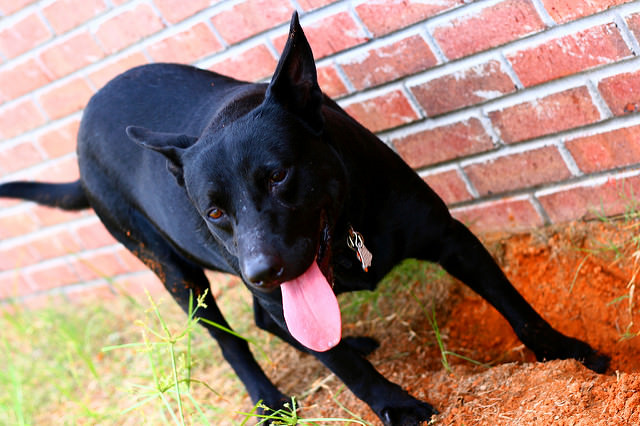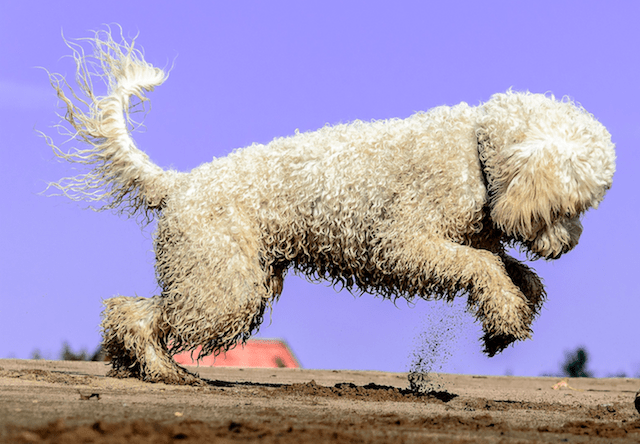We love our dogs and their quirky habits, but sometimes, they can get destructive! One behavior that many pet parents have to deal with is digging in the yard.
While this is a good way to expend energy, most people aren’t fans of having a yard full of craters. Also – it can make a mess! But the first step to get your dog to stop digging is to figure out why she is engaging in this behavior.
Based on research provided by The Humane Society of the United States (HSUS), here are 5 major reasons that dogs dig and how to get them to stop.

1. For Fun
If Fido likes to keep the dirt flying, it could be because he’s bored. This is especially likely if he’s outside for long periods of time, has no person or dog to play with, and no toys to keep him busy. What’s more, your young or working breed dog may be a dirt devil because he can’t figure out how to expend all his excess energy!
If you think your dog is digging to keep himself entertained, try this: keep him tired and busy. If possible, bring your pup on one or two walks a day, engage in one-on-one play, and when you’re busy, provide him with puzzle toys or safe chews to keep him occupied. If you have a working breed, you’ll have to give him a job to do in order to stay out of trouble!
2. Hunting
Another reason your dog may be diving into the dirt is because she’s on the hunt for prey. According to the HSUS, signs of hunting include concentrating in one place, clawing at the roots of trees and plants, and digging in what looks like a path.
If you have a hunter on your hands, try finding out what the prey is then humanely trap and relocate them. You can also consider making your yard undesirable to critters by using safe deterrents or removing the item (say, a certain kind of plant) that they’re after. DO NOT use poison, because that can end up being a danger to your dog.

3. Protection
Sometimes, dogs dig holes in order to protect themselves from the elements, including hot and cold weather, wind, and rain. If there are pup-sized burrows near foundations, near a water source, or in the shade, this could be the case.
While no true dog lover would keep their pets outside in all weather, 24 hours a day and 7 days a week, some pup parents may not be aware of their companion’s sensitivity to certain temperatures. If your dog has been digging, consider whether days that feel temperate to you may be too hot or too cold for your dog – especially for long periods of time. Maybe your dog has become less tolerant of the weather as he’s aged, or maybe he shouldn’t stay out as long. Always make sure you provide clean water and shelter for your four-legged friend, and keep an eye on him to make sure he’s comfortable when getting fresh air.
4. Attention
Just like with little kids, if your pooch is starved for attention, she’ll try to get it one way or another, even if it’s negative. If you ignore your dog for too long, only to acknowledge her when she does something naughty – like digging – she’s going to keep doing it.
If your pup is paws-deep in mud in order to get your attention, try to ignore it; even trying to correct your dog is giving her what she wants. Instead, make sure your pooch gets plenty of positive attention in other ways. Maybe an extra walk or play session is in order.

5. To Escape
Is your dog an escape artist who’s trying to claw his way to freedom? Or maybe there’s a squirrel on the other side of the fence that he’d do anything to get to? Either way, if your dog ends up busting out of his enclosure, it can be very dangerous.
HSUS suggests evaluating your dog’s space to make sure he is comfortable and has everything he wants and needs! Consider adding an incentive, like a new toy, to his enclosure.
If his shelter, water, and toys are all in place, you may need to add extra security for your clever canine. The HSUS suggests burying your fence one to two feet underground, adding chicken wire under your fence and into the ground (while folding the bottom away from your yard), or placing large rocks, partially buried, beneath the barrier.
More Advice
The HSUS says that no matter what reason your dog may be digging, punishing them or “sticking their face” near the hole will not stop the behavior and will only cause fear and anxiety (which may encourage the behavior even more). However, there is nothing wrong with discouraging the behavior by making a loud noise to get her attention, instructing her to “no dig,” and redirecting her attention.
If you realize that your dog is simply happiest while digging and you don’t want to take that away from her, consider designating a special area for her to dig to her heart’s content! You can dedicate a section of your yard for your pooch’s habit, or invest in a sand box for controlled clawing. If your dog starts digging elsewhere, follow the advice above to stop the behavior, then redirect her to her “digging zone.”
